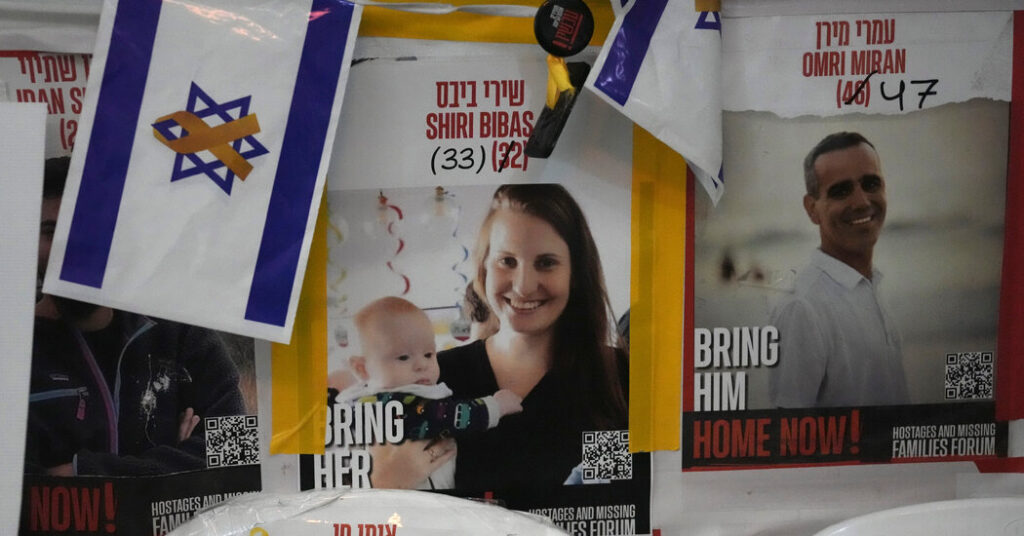Israel said on Friday that one of the bodies Hamas handed over as part of the cease-fire deal did not belong to an Israeli woman taken hostage in 2023, as the Palestinian militant group had claimed.
The revelation prompted further alarm over the future of the brittle truce and hostage-for-prisoner swap deal between Hamas and Israel. Hamas acknowledged there may have been a mix-up.
Here’s what we know so far.
Who were the hostages?
Hamas said on Thursday that it had handed over the remains of four hostages: Shiri Bibas, 32; her two children, Ariel, 4, and Kfir Bibas, less than a year old; and Oded Lifshitz, 83. All four were kidnapped from Nir Oz, a village near Gaza that was devastated in Hamas’s surprise attack on Israel on Oct. 7, 2023.
For many Israelis, the Bibas family had become emblematic of the brutality of the Hamas attack. Footage of a terrified Ms. Bibas clutching her two children while being led away by Palestinian gunmen has been seared into the Israeli public consciousness.
Hamas asserted that all four hostages were killed in Israeli airstrikes. But Israel said that three of the four returned on Thursday — which were identified through DNA testing as belonging to Mr. Lifshitz and the two Bibas children — had been murdered by their captors.
Daniel Hagari, the Israeli military spokesman, said the Bibas children’s captors had killed them “with their bare hands.” He said Israel had shared the forensic and intelligence findings with its allies.
But neither Israel nor Hamas had yet presented evidence for public scrutiny.
What happened on Thursday?
Hamas handed four coffins to the International Committee of the Red Cross in a televised ceremony. Each coffin bore the photo of a captive whose body was supposed to be turned over to Israel, including that of Ms. Bibas.
The display was condemned internationally, including by Volker Türk, the United Nations high commissioner for human rights, who called it “abhorrent and cruel.”
Israeli officials brought the remains to the country’s main forensic institute in Tel Aviv, where three were confirmed to be whom Hamas said they were.
But the fourth was an “anonymous, unidentified corpse,” the Israeli military said early Friday, ruling out that the remains were those of Ms. Bibas.
What are Israel and Hamas saying?
Israel has called the failure to return Ms. Bibas’s remains a severe breach of the cease-fire. Prime Minister Benjamin Netanyahu vowed that Hamas “would pay the full price for this cruel and vicious violation.”
Hamas acknowledged in a statement “the possibility of a mistake or a mixing up of corpses” and said it would investigate, calling on Israel to return the body. The group said it was committed to moving forward with the cease-fire agreement.
What’s next?
Israel and Hamas were set for another hostage-for-prisoner exchange on Saturday — one that would free six Israeli hostages held in Gaza for a number of Palestinians jailed by Israel. Although Israeli officials expressed outrage over Ms. Bibas’s fate, they seemed eager for the next swap to go ahead as planned.
On Friday, the Hamas-linked Prisoner Information Office said that more than 600 detainees would be released in exchange. They were to include 50 Palestinian serving life sentences for deadly attacks against Israelis and another 60 serving long sentences, the office said.
The rest include more than 400 other Gazans detained during the war, the office said. These Gazans had generally been imprisoned without formal charges and were often held incommunicado for long periods.
It was unclear how that exchange would go ahead given Israel’s accusation that Hamas did not uphold its end of the deal.
Even if the swap on Saturday does go forward, big questions hover over the future of the truce, which paused 15 months of devastating fighting in Gaza that killed tens of thousands of Palestinian civilians and combatants.
The first phase of the cease-fire deal expires in less than two weeks, and Israel and Hamas have yet to agree on terms to extend it to a second phase.


